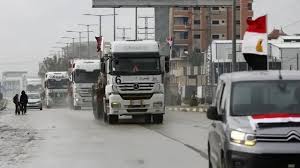Egyptian and Qatari officials held discussions Sunday focusing on Gaza ceasefire implementation and the urgent need for a humanitarian truce in Sudan. Both nations emphasized preserving Palestinian territorial unity and establishing an international stabilization force for Gaza.
Egyptian Foreign Minister Badr Abdelatty and Qatari Prime Minister Sheikh Mohammed bin Abdulrahman Al Thani conducted urgent diplomatic consultations Sunday addressing critical regional crises in Gaza and Sudan. The high-level phone discussion focused on advancing ceasefire efforts and humanitarian interventions in both conflict zones.
According to Egypt's state-run Al-Qahera News, the officials examined developments related to the US-mediated ceasefire agreement in Gaza, reviewing progress since the first phase took effect on October 10. Both ministers affirmed their nations' commitment to consolidating the truce and adhering to agreements reached during the Sharm el-Sheikh peace summit while supporting reconstruction efforts in the devastated territory.
The diplomatic exchange emphasized preserving the unity of Palestinian decision-making processes and ensuring territorial continuity between Gaza and the occupied West Bank. The officials also underscored the necessity of defining clear mandates for an international stabilization force in Gaza under the ceasefire framework, which envisages rebuilding the coastal enclave under new governing arrangements.
Turning to Sudan's escalating conflict, both ministers expressed support for the country's territorial integrity and stability while advocating for an immediate humanitarian truce. They called for establishing secure corridors to facilitate the delivery of critical aid to millions affected by the ongoing violence between the Sudanese army and Rapid Support Forces.
The diplomatic coordination occurs amid continuing violence in both regions, with Gaza suffering extensive destruction and Sudan experiencing widespread displacement and humanitarian catastrophe. The discussions reflect ongoing regional efforts to mediate conflicts that have resulted in massive civilian casualties and displacement across the Middle East and North Africa. Yeni Safak






